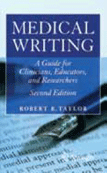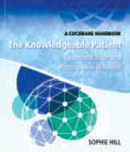Medical writing: a guide for clinicians, educators and researchers, 2nd edition
Robert B Taylor
United States of America: Springer Science & Business Media, 2011
ISBN 978 1441 982 339, $40.77

For the medical reader journeying to the 'input' side of a publication, 'Medical Writing' makes a fine companion.
This book falls somewhere between a discursive read and a reference guide. The first five chapters warrant thorough attention, covering not only the essential toolkit of word use, paragraph structure and technical aspects, but also answering the fundamental questions, 'What should I write?' and 'How do I start?' The arduous journey from blank computer screen to reading your name in print should be hugely rewarding. Later chapters cover specific aspects of medical writing such as research, letters to the editor and book chapters, possibly best dipped into as a reference when occasion demands. The internet earns a mention only as a writing tool, not a destination, so medical writers curious about publishing online will remain unenlightened.
Taylor's conversational style conjures images of a friendly grandfather dispensing wisdom and encouragement to his fledgelings. No topic escapes a sprinkling of gentle humour; his application of Kübler-Ross's stages of grief to the receipt of a rejection letter lightens the mood during that grim moment of loss familiar to every writer. As Taylor writes, his substantive credentials as an author are not his hundreds of published chapters and articles, but the fact that he has 'made all the errors' and copped the rejection letters before us.
I found myself busily earmarking pages with particularly apposite quotes or advice. It's no trouble mentally correcting Americanisms such as, 'Do not call an anesthesiologist an an[a]esthetist,' particularly when his final pearl is a beauty: aspiring writers should join the [Australasian] Medical Writers Association!
Justin Coleman
President, Australasian Medical Writers
Association, Brisbane, Qld
The knowledgeable patient: communication and participation in health
Sophie Hill
United Kingdom: Wiley-Blackwell, 2011
ISBN 978 1444 337 174, $67.95

This slim book is from the Cochrane Consumers and Communication Group based at La Trobe University. Sophie Hill has edited 18 chapters from an impressive array of national and international academics and contributed to most of the chapters along the way.
In the preface, it is made clear the book is intended 'for people who are interested in a consumer perspective on health issues', including those training to be health professionals, postgraduate students and those involved in health policy. This multifaceted book explores the field of evidence based communication with patients and carers in order to optimise health outcomes.
'The Knowledgeable Patient' is very well written and easy to read. The brief chapters are mostly in the format of self contained review papers around a topic, with the editor tying sections together with bridging references between chapters. Topics covered include examining the evidence of the adequacy of communication between health professionals and consumers, developing frameworks and taxonomies for advancing evidence informed communication, communicating risk, disclosure of medically acquired disease risk, communication and multimorbidity, in hospital communication with women regarding caesarean section, health literacy and emerging technologies for health communication. Each chapter is well referenced.
I found several chapters of particular value from the perspective of clinical practice. The chapter on communicating risk and risk statistics for preventing chronic disease was very helpful. In the context of GPs increasingly being encouraged to assess absolute cardiovascular disease risk in making management recommendations for patients, this chapter was very timely. The chapter concerning communication with patients with multimorbidity was especially well written and referenced. Helping patients with multiple health problems is a bread-and-butter activity in general practice, but a neglected area of research and policy. This thoughtful chapter would strike a chord with most GPs.
In my opinion, 'The Knowledgeable Patient' has some significant weaknesses. My chief concern is that the contexts of primary, secondary and tertiary care are not seen to generate fundamental differences in communication. It is not until page 139 that it is mentioned that communication may be in the context of a long standing relationship between a patient and a clinician. For many GPs, this would seem an odd delay in acknowledging what we would see as foundational for a large amount of our interactions with patients. More minor concerns are that there are some major disjoints between chapters (eg. the chapter on multimorbidity is immediately followed by the one on caesarean section) and a lack of structure in the overall content. There were introductory chapters, but no explicit grouping of the following sections and, strangely, no discussion chapter as a conclusion. I had felt that consistent application of an underlying theoretical framework may have helped tie this book together better.
Overall, this book is a welcome reminder of the importance of communication with the central person in the healthcare team – the patient – and a primer to the relevant research literature. However, the book's key audience will be healthcare researchers, academics and policy advisors, for which I expect it will prove a valuable resource.
Andrew Bonney
Wollongong, NSW